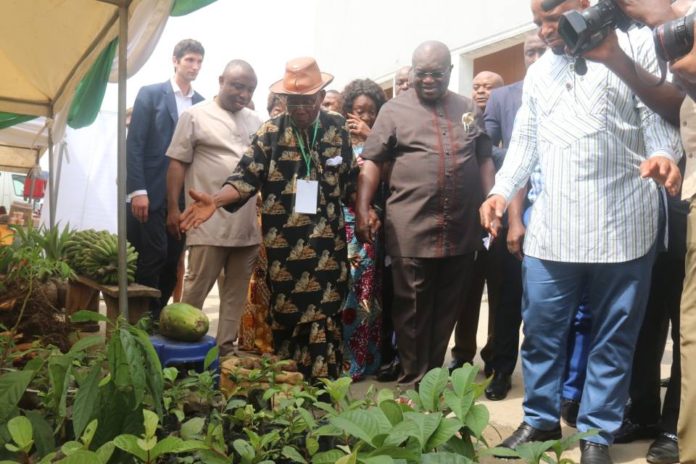By Kingsley Maduforo
Agriculture was the mainstay of Nigeria’s economy before the discovery of crude oil. From 1960 to 1969, the sector accounted for an average of 57 percent of the Gross Domestic Product (GDP) and generated 64.5 percent of export earnings. From 1970 to the late 2000s, the sector’s contribution to the GDP and export earnings steadily declined because Nigeria’s focus shifted to petroleum exploration. Over the past five years, the sector has contributed an average of 23.5 percent to GDP and generated 5.1 percent of export earnings.
The recent fall in the price of crude oil has triggered conversation around the role of agriculture in economic diversification. The agricultural sector requires massive investment to increase production and to create value addition across the most profitable segments of the value chain.
The socio-economic development, and its subsequent economic growth, of the nation is strongly linked to the level of growth in the agricultural sector. Lack of adequate improvement in the agricultural sector of the economy is one of the major factors hampering development. The level and quality of policies influencing agricultural growth are of crucial significance on economic and social progress, and they must be considered at every stage of local and national development. Agro-business can therefore effectively drive the socio-economic development of the nation without reliance on crude oil.
To this end, the Central Bank of Nigeria (CBN) has amended the Commercial Agriculture Credit Scheme (CACS) following which it pegged maximum loan intake for any project under the scheme at N2 billion. It equally pegged the maximum interest rate under the scheme at nine (9) percent, inclusive of all charges.
The Governor of Abia State, Dr. Okezie Ikpeazu, has shown his recognition of the great opportunities in the agricultural sector. The rapid growth in agro-business in the state has increased the demands for agricultural products by domestic consumers and the income of farmers in the state and has also offered market opportunities for developing various high value crops that will support the diversification of the economy of Abia State through agriculture.
In line with the Central Bank of Nigeria (CBN) amendment and Abia State Government’s effort to ensure food production, the State Government in collaboration with CBN has rolled out the CBN Accelerated Agricultural Development Scheme which centers on capturing and empowering youths who are interested in agro-business.
Agriculture remains a critical key to the Economic Recovery Plan (ERP) and the wider economic growth and development of Abia state. Agro-business is experiencing a boost in entrepreneurial success. The support provided by Gov. Ikpeazu to develop agro-business in the state, by involving both young and old is a great success. Agro-business has played a key role in poverty reduction, creation of employment for youths and the increase in the Internally Generated Revenue (IGR) of the state.
Abia state which has a land size of 5.835sqkm, with a population of 2.8 million, is blessed with human and natural resources, including fertile land and can produce what can sustain it without depending on oil or the federal monthly allocation. This is what has prompted Gov. Ikpeazu to actively engage and support the drive for agriculture more especially in mechanized farming of cassava, rice, and oil palm in line with federal government programmes and our state’s areas of natural advantage.
Finally, Agriculture is an important sector in our country and the developing world today. It is a contributor to economic growth and development, as well as a major source of employment to sizable number of the people, especially those in our rural areas. It is of prime importance that government increase its spending on agriculture by granting more credit and loans to farmers, just as the present administration in Abia State. There is need to engage them properly for our own profit. Indeed the sector has sufficient scale and growth linkages to significantly influence aggregate growth and development of any state and should therefore be exploited.
Kingsley Maduforo, a Media Analyst, writes from Aba.
